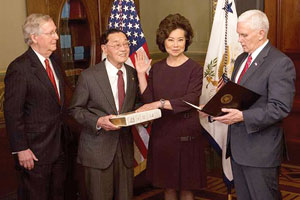Senior Reporter
Chao Confirmed as DOT Chief; Tech, Infrastructure Top Agenda

This story appears in the Feb. 6 print edition of Transport Topics.
Directing the resources of the U.S. Department of Transportation to revamp the country’s infrastructure and establishing a policy framework for autonomous vehicles will be the top priorities for the Trump administration, said Elaine Chao, the country’s newest secretary of transportation.
“While our transportation infrastructure has given us unprecedented mobility for many years, it is increasingly in need of repair and refurbishment. Another challenge facing the transportation infrastructure is how to incorporate new technology and innovations, including drones and autonomous vehicles,” Chao wrote on the department’s website.
The Senate easily confirmed Chao as the 18th secretary of transportation Jan. 31, adding to the Trump team a key officer in its quest to achieve an ambitious infrastructure agenda this year.
Ninety-three senators backed her nomination, and Majority Leader Mitch McConnell (R-Ky.), Chao’s husband, voted “present.” Democratic Sens. Chuck Schumer of New York, Cory Booker of New Jersey, Kirsten Gillibrand of New York, Jeff Merkley of Oregon, Elizabeth Warren of Massachusetts, and Vermont Independent Sen. Bernie Sanders voted against her.
The chairman of the Senate Commerce Committee, John Thune (R-S.D.), strongly endorsed Chao.
“Chao has the experience, ability and now the bipartisan backing of the Senate to address our nation’s transportation and infrastructure challenges. Her unwavering commitment to public service will be an asset to the Department of Transportation and the new administration,” Thune said in a statement. “As a new era begins, I look forward to working with her on an agenda to boost innovation and our country’s economic success.”
The White House and Chao have endorsed public-private partnerships as an ideal approach for financing fixes to outdated transportation systems. On Feb. 2, the DOT-led Chao offered a glimpse into its vision for funding infrastructure projects. Officials at the Federal Highway Administration and the Build America Bureau unveiled a guide for financing highway projects via public-private partnership. The agencies emphasize that states and localities need to establish guidelines and lay out clear objectives when they seek financial assistance with P3s.
Outside of Washington, state leaders and industry stakeholders balk at relying on just public- private partnerships. They have expressed enthusiasm for other funding proposals, such as raising taxes on fuel and charging vehicles for miles traveled, as a way of unclogging congestion at critical freight corridors in megaregions.
“Wherever she has gone, Secretary Chao has demonstrated the kind of leadership and vision we need to address our nation’s pressing transportation issues, and we look forward to quickly getting to work with her,” American Trucking Associations President Chris Spear, who worked for Chao at the Labor Department, said in a statement.
Marshall Doney, CEO of AAA, said Chao has demonstrated ability in identifying “solutions for transportation safety and funding challenges and intelligent transportation systems, automation and other shared priorities.”
“AAA firmly believes that significant, additional investments are needed to maintain existing infrastructure and to enhance the nation’s system,” Doney said.
Ray LaHood, former secretary of transportation and co-chairman of Building America’s Future, expressed confidence under Chao’s leadership that the nation’s roads, rails, runways and transit systems “will be in good hands.”
“Chao has a strong understanding of Washington and how to engage the private sector, as well as the importance of consulting with mayors and governors,” LaHood said.
Chao has remained mostly silent on whether the White House would unveil a $1 trillion, 10-year investment plan for infrastructure by providing tax credits to private investors. At her confirmation hearing last month, she also avoided questions on air traffic controllers and greenhouse-gas emissions.
Trump’s campaign platform included the promise of “a bold, visionary plan for a cost-effective system of roads, bridges, tunnels, airports, railroads, ports and waterways and pipelines.”
Despite Trump’s promises to invest heavily in infrastructure, finding the money may not prove any easier for Chao than it was for her predecessors of the past 10 to 15 years. Every year since 2008, the federal Highway Trust Fund, the account that pays to build and maintain roads, bridges and transit systems, has fallen short of the revenue needed by the states.
Since 1993, Congress has not raised the federal taxes on fuels — 24.4 cents a gallon on diesel and 18.4 cents on gasoline — that support the trust fund. Transportation spending exceeds revenues by $14 billion a year, and that’s projected to increase to $21 billion a year within eight years.
“The Highway Trust Fund is in bad shape,” Chao soberly noted in her Senate confirmation hearing Jan. 11.
She has long-standing credibility in the transportation world, having served as DOT’s deputy secretary from 1989 to 1991 under President George H.W. Bush. Chao also served as secretary of labor in President George W. Bush’s administration.
Wire reports contributed to this article.

